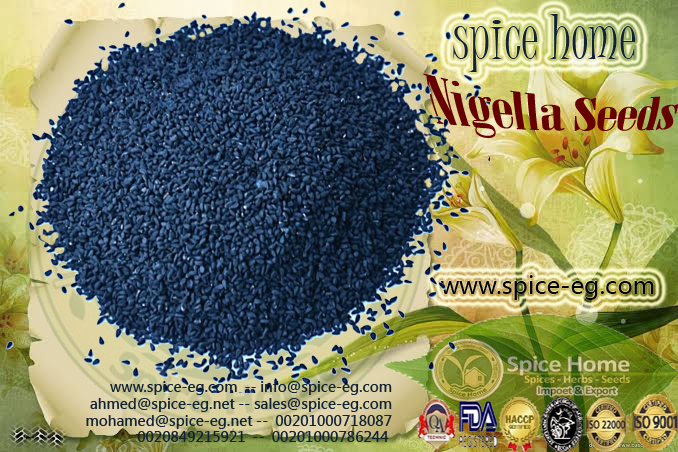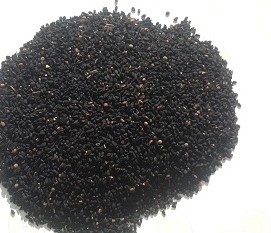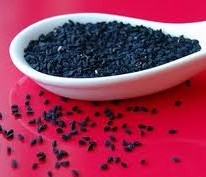
Nigella sativa
Nigella Seeds
| Botanical Name | ( Nigella sativa ) |
| Available Form: |
|
| Season: | Available all the Year |
| Packing: | in bage 25 - 50 KGS Net Weight. |
Annual production capacity : 350 Ton
Storage conditions: Store in a cool dry place at temperature above 20 ° C and relative humidity 75%.
Storage conditions: Store in a cool dry place at temperature above 20 ° C and relative humidity 75%.
Nigella benefits
Nigella benefits
Nigella and melatin are two ingredients in Black Seed that contribute greatly to its highly diversified powers. These substances work together to provide the digestive benefits that have been revered in the Black Seed. They also promote cleansing and assist with overall eliminating action.
Two of the most volatile oils found in Black seed are nigellone and thymoquinone which were first discovered in the herb in 1985. Nigellone offers both anti-spasmodic and bronchodilating properties which contribute to Black Seed's potency against respiratory ailments. It also acts as an antihistamine which helps to reduce the negative symptoms of allergy sufferers.
Thymoquinone contains excellent anti-inflammatory and analgesic properties. It is also a strong antioxidant and helps cleanse the body of toxins. Both nigellone and thymoquinone work in conjunction with one another to enhance Black Seed's action against respiratory ailments. It also provides a healthy alternative to the more commonly prescribed cortisone based therapies used by allergy sufferers. Black seed provides a rich supply of polyunsaturated fatty acids. These ingredients play a key role in daily health and wellness. They help regulate the metabolism, carry toxins to the surface of the skin for elimination, balance insulin levels, regulate cholesterol, improve body circulation, and promote healthy liver functions. A deficiency in polyunsaturated fatty acids can lead to a wide number of health problems including nervous system disorders, uninhibited growths, and skin diseases.
Black seed contains over 100 valuable nutrients. It is comprised of approximately 21% protein, 38% carbohydrates, and 35% plant fats and oils. The active ingredients of black seed are nigellone, thymoquinone and fixed oils. Black seed also contains significant proportions of protein, carbohydrates and essential fatty acids. Other ingredients include linoleic acid, oleic acid, calcium, potassium, iron, zinc, magnesium, selenium, vitamin A, vitamin B, vitamin B2, niacin, and vitamin C.
A 1994 study conducted in London by King's College revealed that Black Seed has properties that inhibit certain enzymes, which also inhibit the production of certain prostaglandins. This is more proof that the rich and complex combination of elements found in Black Seed work together for a total effect.
Specification
Physical / Microbiological analysis
Physical characteristic |
|
|---|---|
|
colour |
Dark black |
|
aroma |
grassy and herbaceous |
|
flavour |
characteristic flavour |
|
aspect |
Black cumin seeds |
|
particle size |
Seeds |
Microbiological analysis |
|
|---|---|
|
salmonella |
Not detected in 25g |
|
escherichia coli |
absent |
|
Yeast/mould (cfu into 1g no more than) |
0,10 x 103 |
Chemical Analysis
Chemical Analysis |
|
|---|---|
|
moisture % |
6.00 |
|
extraneous matter % |
absent |
|
living & dead insects % |
absent |
|
mineral dirtines contents % |
absent |
|
organic dirtines contents % |
absent |
|
allergens material |
It does‘t contain |
|
Metal particles % |
Absent |
|
Pesticides residues |
Meet eu regulations |
|
Heavy metals (sr, sс) |
Absent |
|
Fixed oil |
35.00 |
|
Volatile oil ml/100 g |
1.50 |



